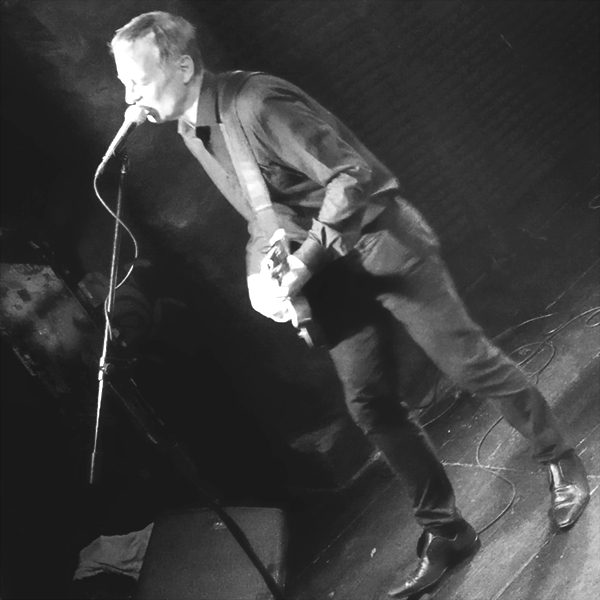
You can support Terra Relicta by donating! Please, do so, and thank you!

One of the bands which were "there" when gothic/dark rock music started getting its form as we know it today is the German post-punk Pink Turns Blue. The cult band formed in 1985 and was a part of the first generation of gothic rock in its country. The legendary debut album, If Two Worlds Kiss, was released in 1987 and followed by six more albums until the band took a long hiatus in 1995. Pink Turns Blue appeared again due to a request for a one-off reunion show at the Wave-Gotik-Treffen in June 2003. Then it reformed and played as headliners at M'era Luna 2004. Since Pink Turns Blue started kicking again, it released five more albums, several EPs and singles, of which the latest full-length, Tainted, is a true post-punk masterpiece. Right after the band's stunning show on 13 April in Ljubljana (Slovenia), we had a nice talk with its founder and the only remaining original member, singer, guitarist and songwriter, Mic Jogwer. Read on and find out what he had to say.
Interview with: Mic Jogwer
Conducted by: Tomaz, Jerneja
Edited by: Jerneja
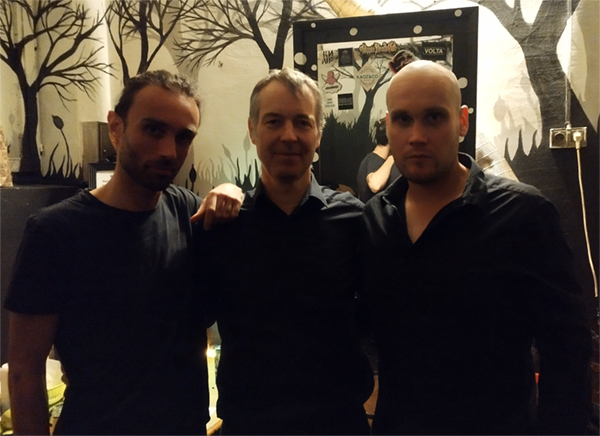 Tomaz: Hello, Mic. Welcome to Ljubljana. I guess that you have many memories of this city?
Tomaz: Hello, Mic. Welcome to Ljubljana. I guess that you have many memories of this city?
Mic: Yeah, sure. The last time I was here was two years ago with my wife, just showing her the city, and it has changed a lot. Now it has a lot of students; it's a modern, young city with a lot of happening. The previous time I was here was in 2000 and something. Before that, it was in 1990, 1989 and 1988; so, a long time ago. Back then, everything was grey, eerie and funny, but with very nice people in the funny surroundings. The last song we played in the official part of the show, "Your Master Is Calling", was recorded here in Ljubljana, in Tivoli Studio.
Jerneja: Although you have so many connections with this city, namely, some Pink Turns Blue releases were produced and/or mixed in Slovenia by Janez Križaj, today you played here for the first time...
Mic: You are right. In the past, it was not that easy to play here. There were people asking us, but we were not allowed to play here. At the end of the 80s, everything was under the city's control and certain cultural institutions. We were trying, but we didn't get any permission to do that back then.
Tomaz: Your last album, Tainted, came out in 2021. So, how are you still satisfied with it two years later?
Mic: Very much. Tainted reached new and also young audiences. Also, we got back some old fans from the times of If Two Worlds Kiss and Meta. They are still coming, and think about it that it's great. Nevertheless, with Tainted, our old audience became a lot younger. They are still into this post-punk sound, but they got different themes. There are other things that I worry about. In the 80s, everything was about the cold war, the separation between East and West and similar stuff. Nowadays, it's more about climate change, equality, and sexual liberation. You don't have to be a man or woman or anything; you only need to be free. So, it has changed a lot. Topics have changed, and new topics reached younger audiences who are still into, let's say melancholic dark music, but they have different things to talk about.
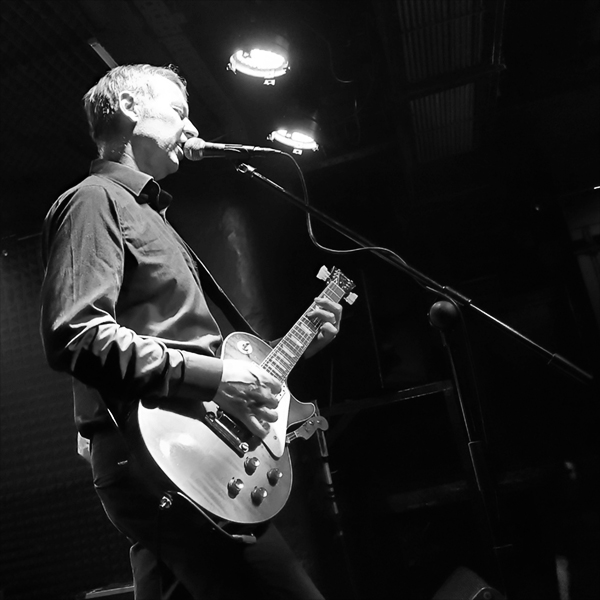 Tomaz: Although the lyrics' topics changed, your music still has that typical Pink Turns Blue post-punk sound you evolved back in the 80s. It hasn't changed that much through the years. Still, what's the difference in making music back then if compared to today?
Tomaz: Although the lyrics' topics changed, your music still has that typical Pink Turns Blue post-punk sound you evolved back in the 80s. It hasn't changed that much through the years. Still, what's the difference in making music back then if compared to today?
Mic: Yeah, yeah. Let's say that back then, in the 80s, many bands were trying to create new sounds, and we were one of them. Then it came to the repetition, a copy of a copy of a copy, and it was getting more and more boring. In 2010 there were new and young bands coming up to the scene, like the Italian band Soviet Soviet, the Berlin-based band Lebanon Hanover, and She Past Away from Turkey, actually bands from all over the world doing this kind of sound, but in their own innovative and very creative original way. That got us back to say, "Oh, look, there's a real, alive and creative scene in now again with our type of music". Many of these new bands liked Pink Turns Blue very much, saying we were their heroes. And so they got us back somehow. We are travelling with them, playing with them, sharing the stage at festivals, doing compilations together, and everything feels alive and kicking again. We are not playing to the same "old people" anymore. Here's this new generation which likes this music. So, that has changed a lot.
Jerneja: Regarding lyrics... You've always had these society-connected topics, with a pinch of criticism, though with a positive notion. So, it's more like the society has changed, its interests and problems, and consequently, the Pink Turns Blue lyrics' topics.
Mic: In a way, it's the same topic today as when I was 20 years old and started this band. It was about how you don't feel at home in one society or the other. You know, you feel like in between. Post-punk has a lot to do with the feeling that you are different, not feeling at home with your parents, not feeling at home with your career, belonging to anywhere you are, a kind of, lost. You are searching your way, and that's why our most popular song, "Walking On Both Sides", is very popular with many people, because they feel, "I'm a part of this world and I'm a part of that world", somewhere in between. Nowadays music has the same ideas but attracts young people who don't want to say I'm this or that. They are just wandering around, and sometimes they feel gender-wise or sexually-wise not stuck on one thing. They don't want to have one career, to be a mother, a woman or something; they want to have everything; they want to try their alter-self, to search for themselves, and that's the topic of Pink Turns Blue. Really, like that you are wandering between the worlds. Nowadays, the topics are different, and that's a positive thing. My songs are an anthem for fighting, for making this world a little bit better, your life a little bit better, or your friends' life a bit better. It was always like this, "yes I'm sad, I'm not happy with the world as it is but I'm not just crying and I want to find ways to change things".
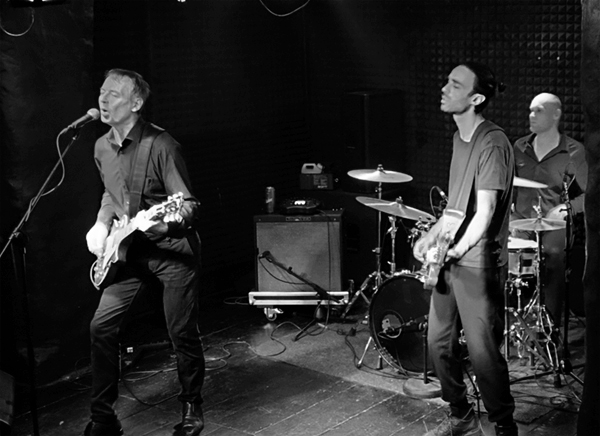 Tomaz: Last year, you released a Tainted Tour 2022 EP. Does it consist of B-side songs meant for the latest album?
Tomaz: Last year, you released a Tainted Tour 2022 EP. Does it consist of B-side songs meant for the latest album?
Mic: Yes, kind of. I selected a few songs for the album Tainted that I thought I would be happy with them. I still had a poll of songs that were pretty strong but were not 100% finished. Then I met Luca, the bass player; he has his own studio. I said to him, "Listen to the songs I've written, and, I think that they are pretty strong, but how do you like them?" He liked them very much and said we should go back to the studio and record them as an addition. It worked well because we planned a tour in America, but due to the pandemic, everything got delayed. We had to do it in 2021, but we did it in 2022. The Canadian promoter asked us if we had any songs we could re-release or maybe if we had any new songs. We said we could try and see what comes out of it. Those two songs, especially "Not Gonna Take It", were really a success; because it was about the Ukraine war. About mobbing and about fighting back, so everybody liked it. It was a good idea to do it.
Jerneja: The Tainted songs are played a lot on our radio station, and it seems listeners like them since they reached the Top 10 position quite a couple of times. Could we soon add some new Pink Turns Blue tracks on Terra Relicta radio?
Mic: Oh, that's pretty cool to hear. Yeah, we are. We only have three days left in Europe, and then we'll get a big summer break. I'm just building a house with my own studio right now, and it's about to be finished. I have started writing new material, but I don't consider them as songs, maybe more as new ideas. We hope to write a new album until next year. We have to do another German tour this autumn because we had to postpone it due to the pandemic. Then we will do some shows in Europe next year, including Holland, France, Spain, Belgium and Turkey, maybe a few more, like Finland perhaps. And we hope to release a new album in the summer of next year.
Jerneja: Good luck with building the house with the studio; a label you already have, right?
Mic: Yeah, you are right. We had many labels before, and it was always difficult. We also had one in America, Dais Records, releasing our stuff in America. Sometimes it was really difficult with labels because they like to discuss things, and you don't know if you'll get your money or not. These days it's pretty easy to release your stuff by yourself. It's a bit of work, but it's not difficult at all.
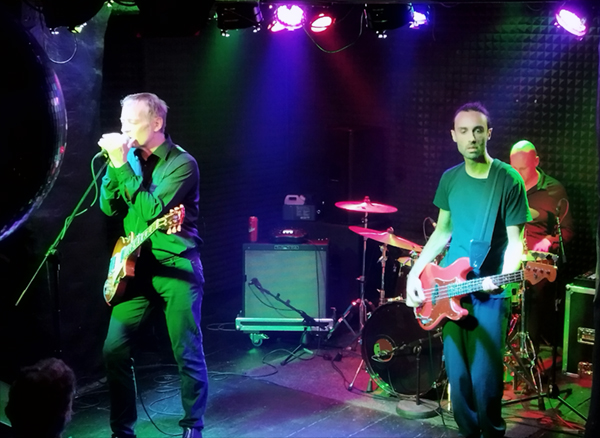 Jerneja: Do you release only your music through your label?
Jerneja: Do you release only your music through your label?
Mic: Right now, yes. I released other bands, like ten or 15 years ago, but it didn't work out well because some bands don't work that hard. They make some good songs, and then they kind of dissolve; they fight each other. For the labels, it's sometimes really hard because you can have a pile of CDs and LPs sitting there, but the band just dissolves. Sitting with all this stuff can be really expensive. With Pink Turns Blue, it's ok. We release a new record, go on tour, do the promotion, and it's way less risky. I'm thinking of releasing more bands, maybe in the future, but I'm not 100% sure. Label work is very different from the music work.
Tomaz: I'm sure you've got many offers from different labels. Did you refuse them all?
Mic: Labels can't do a lot for bands and artists nowadays. You know, the big names are kind of ok, but there's not much they do. They hire a promoter, release the album, and that's it. In the past, the label work was a very hard one. They did a lot of jobs back then, but nowadays, with Spotify, Apple Music, Amazon Music,... you know, they don't do much. These days, it's not certain for bands if having a label is a good option.
Tomaz: You now live in Berlin (Germany), but in the early 90s, you moved to London and started a new project, a different kind of, compared with Pink Turns Blue...
Mic: Yes, but for a very short time, not even worth mentioning it.
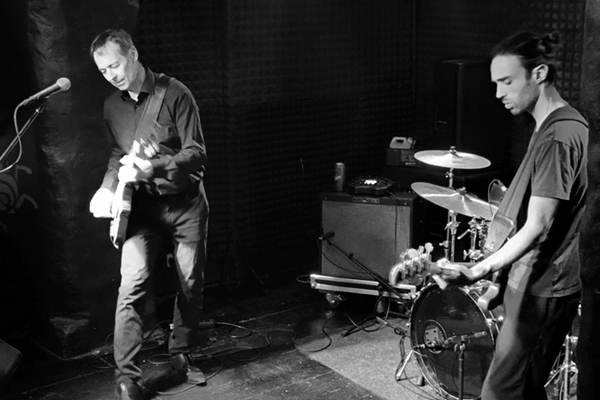 Tomaz: Before we end the interview, I must ask you how did you enjoy the concert tonight?
Tomaz: Before we end the interview, I must ask you how did you enjoy the concert tonight?
Mic: Very much! Basically, I love playing in small clubs because the band is very close together, and you can just close your eyes and play the songs. You concentrate on music, and you're very close to the audience. You can feel if they like it or not. It's a very close feedback that you are getting.
Jerneja: Thank you very much for taking the time for this interview Mic - especially on such short notice and this late. Is there anything you would like to say at the end of it?
Mic: Make the world better every day. Keep fighting and not giving up.
(Photos by Tomaz)
Pink Turns Blue links: Official website, Facebook, Twitter, YouTube, Wikipedia
